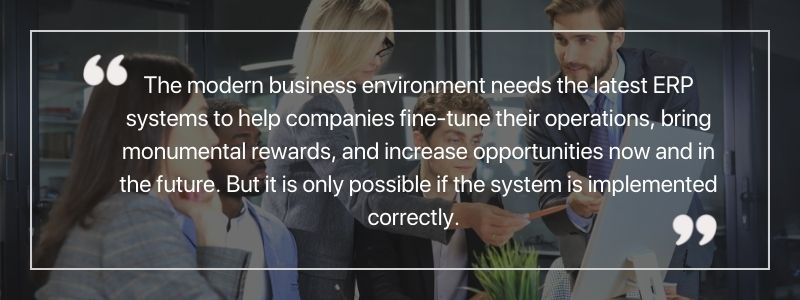7 Practices for Successful ERP Implementation
When you decide to implement an ERP solution, your concern about budget overruns, project delays, and organizational disruptions is valid. But all these could be fixed, and your business could still go back on track the moment your ERP system starts functioning with its full potential.
The primary concern here is the improperly implemented ERP application. It could take months of backtracking and fixes before you start recovering your lost revenue or customers.
An unplanned approach could make you run a significant risk of ERP project failure. A well-designed strategy and a realistic plan are what you need to see undoubted success. If you want to ensure that your ERP implementation process runs smoothly and that you get the most out of your new system, here are some critical best practices to follow while deploying the solution:
Adequate or greater scoping of ERP
ERP implementation success is defined as getting the deployment done on time and within budget while bringing a satisfactory ROI.
When getting ready for an ERP, begin by figuring out your business goals and requirements. Start by identifying the processes involved and their short falls to avoid wasting money or slow productivity. Communicate with appropriate personnel and seek their input to build your ERP implementation strategy and define its scope.
New system implementation is going to impact your entire organization, so be sure to prepare everyone related by employing appropriate change management strategies before the work even begins.
While mapping a successful ERP strategy is essential, you would also need to realize that, at first, the system may not be able to full fill all of your organization’s requirements. It would achieve results gradually. Here, getting a well-tailored ERP platform whose components fit your business would help you achieve your initial priorities first.
Select the right ERP implementation partner
Your ERP partner is going to become part of your business, working with you throughout the implementation and years beyond. Selecting the right partner is a very critical component of your successful ERP implementation journey.
So, look for a partner with deep knowledge of their system, extensive experience working with companies from the same industry as yours, and a reputation for implementing solutions within a defined timeline and budget.
Also, establish a strong business relationship with your ERP partner to bring long-term success to your system. The point here is that your ERP software requires continuous care and maintenance to keep it running at peak performance. And this is easier to achieve when you could rely on your ERP partner when you need their support post-implementation.

Enable executive management commitment
Now that you know your business requirements and have selected your ERP vendor, it’s important to designate the project manager to oversee and make sure your deployment process is on track. Your ERP vendor may assign you a project manager. Still, it would help if you appointed a dedicated internal executive or team of elected people to ensure minimal interruption to your business when integrating the solution.
Ideally, this person or the team needs to be thoroughly involved in the ERP on boarding process from day one and work alongside the vendor to coordinate coding customization, data conversions, application migration, and training necessity.
Without having internal staff keeping a tab on your new software implementation, it would most likely fail.
Sufficient or adequate budgeting
Like every other project, you need to create a reasonable estimate of your ERP implementation costs, constantly monitor them, and keep tight control over them. Achieving this goal starts with creating a thorough list of all potential elements that could be a part of your ERP implementation project.
Once the elements are known, the next step would be estimating the cost for each and preparing a realistic budget to include expenses attributed to software, hardware, staff, change management, training, and other resources. If you try to reduce the budget of the necessary elements in an attempt to improve your return on investment (ROI), it could potentially lead to the risk of project failure.
Adequate change management and training
ERP implementation would not only bring system change but change the way people do their jobs. Therefore, it is important to train users on the new system and processes to make the transition easier. Without proper training, your end-users could feel like they just swapped an old, obsolete system for an unusable newer one.
You need to develop a consistently good communication strategy between the deployment team and end-users, involve them as the project progresses, and consider hiring a trainer during and even after the system goes live. All these would aid your employees in accepting the change, and your company would benefit from the transformation sooner.
Experienced project management and project team
There is a need for a core project team comprising a project manager and self-driven individuals who are experts in their domains and have strong knowledge about your business processes. Identifying the right resources is the building block of a good team, and establishing their defined responsibilities upfront would set your ERP implementation up for success.
Limit modifications or customizations
An up-to-date ERP system is usually embedded with the best industry practices to streamline business processes and collect data for insightful organization handling. Over customizations do have the potential to diminish these practices. So, limit or avoid it. Focus only on the critical business functions and ensure their need is adequately justified before considering customizations. Additionally, these modifications would also increase the budget.
Are you in Control of All These Factors?
Focus Softnet is one of the most trusted ERP vendors. We could help you design the most effective plan of action and deploy ERP system through well-designed change management that could bring sure success! Fill in the form to experience hassle-free ERP deployment.







